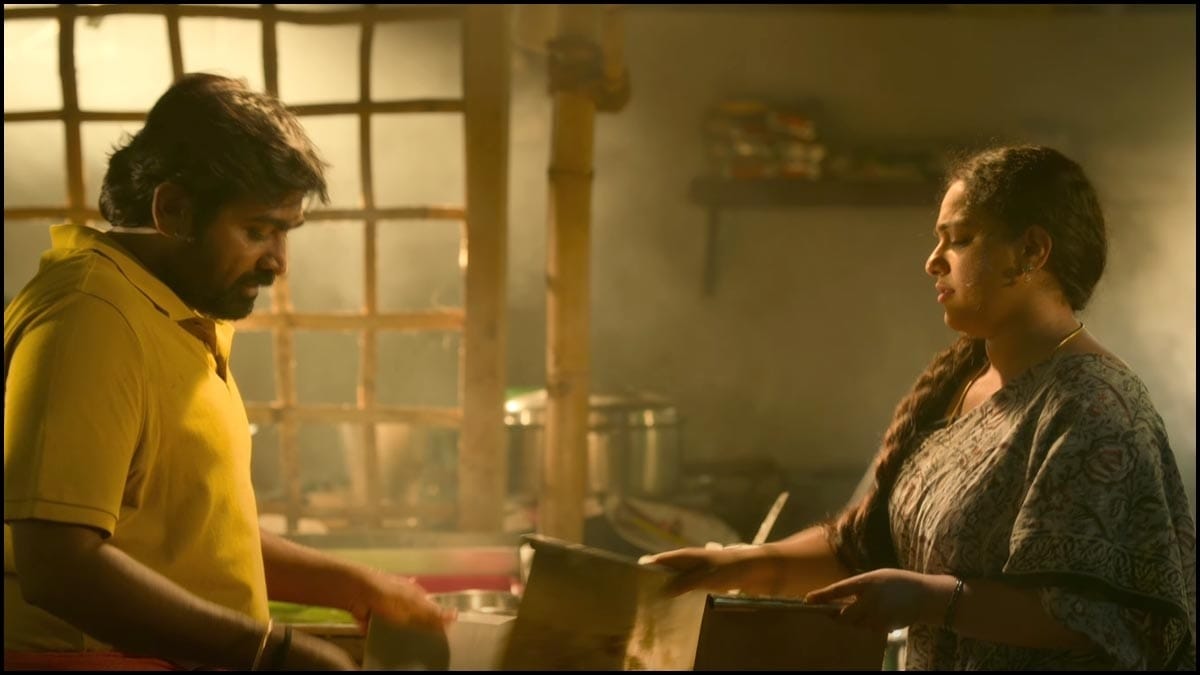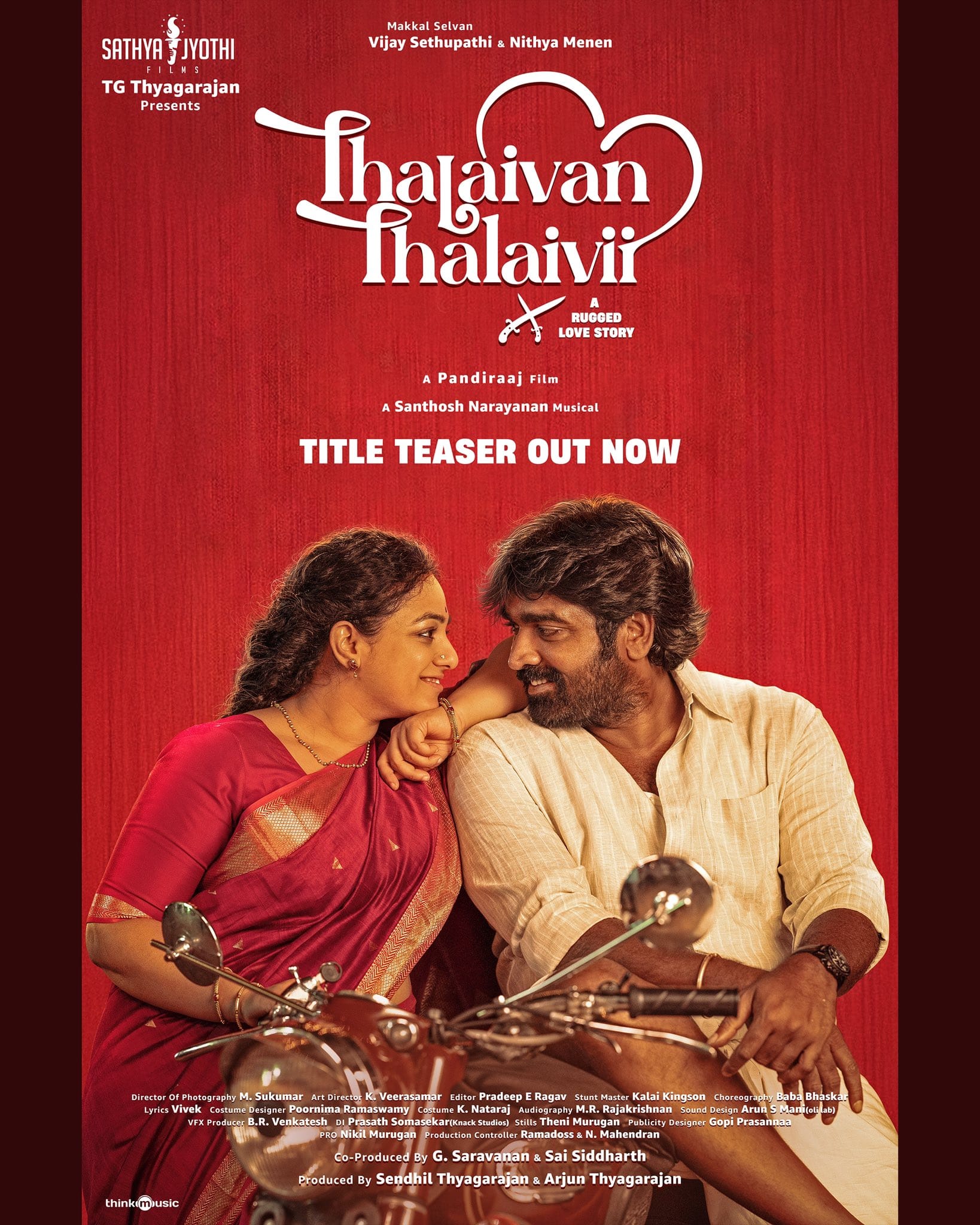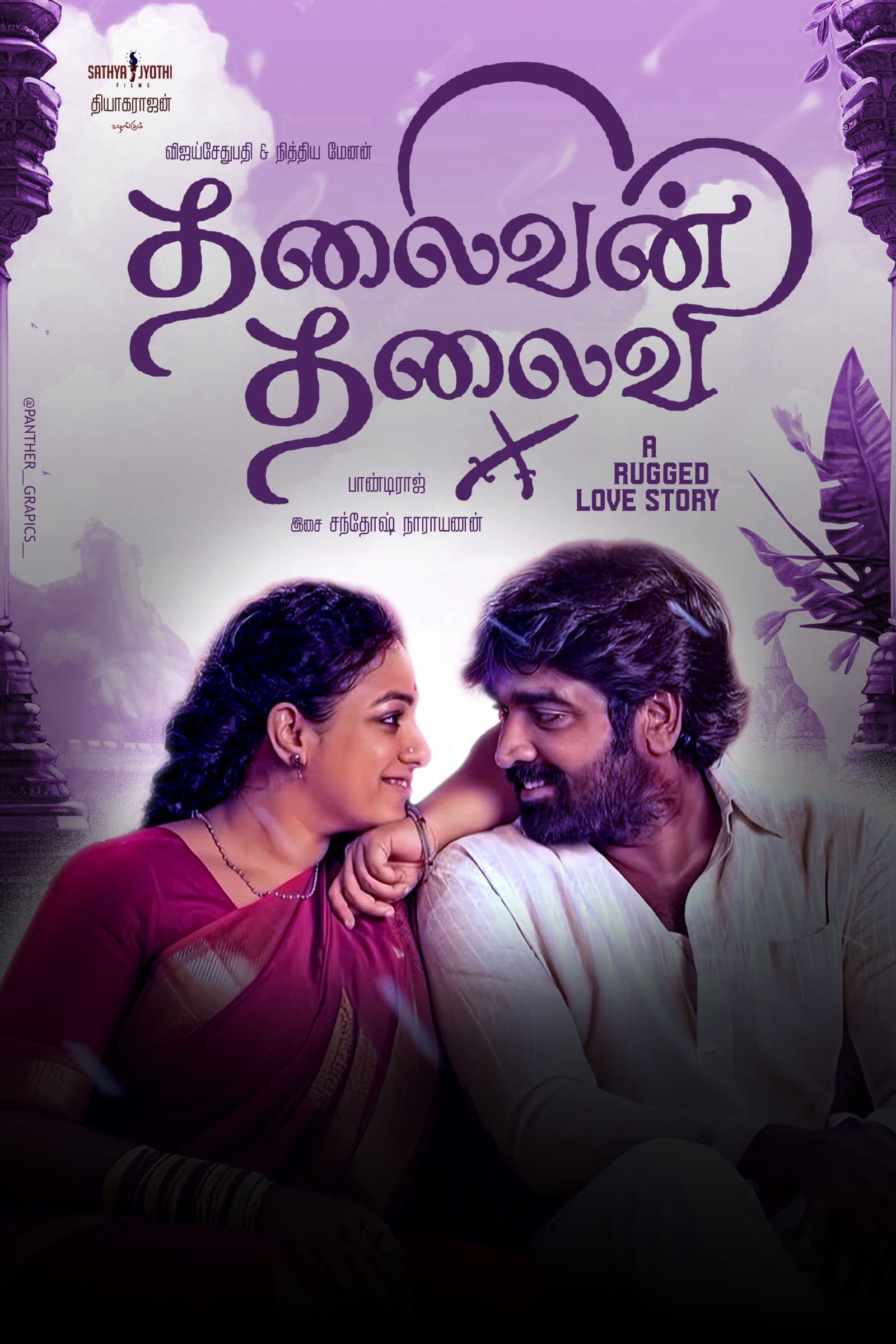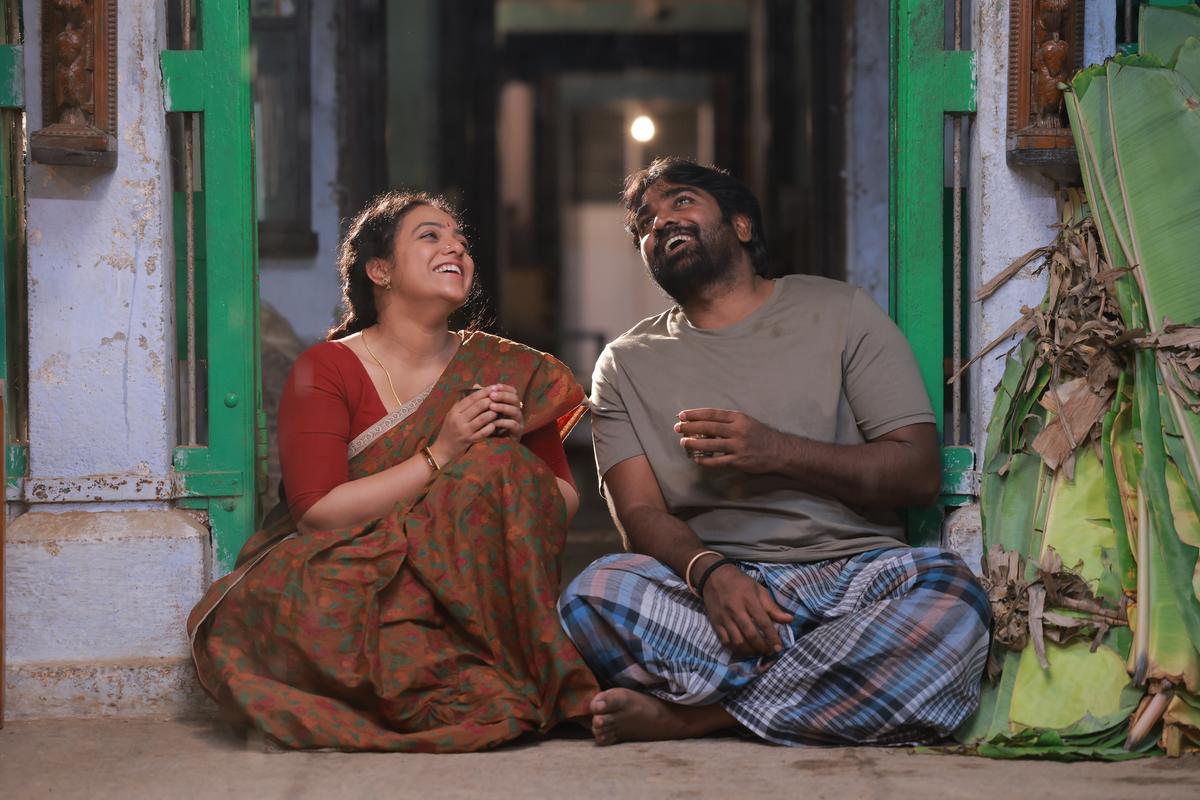Thalaivan Thalaivii is a Tamil film starring Nithya Menen and Vijay Sethupathi. It revolves around the volatile marriage between the characters they portray, and how both of their families strain this relationship. The film starts with a shot of a giant rock with the names Agasaveeran and Perarasi. This gives the sense that what we’re about to see is a grand story, something that’ll go down in history. And it is in fact narrated that way. The central characters are a loud couple, almost to the point of being obnoxious. Their presence is definitely felt in every scene, whether they are fighting or displaying love.
The central couple of Thalaivan Thalaivii: Agasaveeran and Perarasi
The grandness that Thalaivan Thalaivii aims for is also evident through the names of the characters. The male protagonist’s name is Agasaveeran (which means a warrior of the sky) and the female protagonist is Arasi (which means queen). However, Agasaveeran (or Agasam, as he is sometimes called) nicknames her Perarasi (which translates to empress). Everything about them, and in fact, everything about the film tries to be loud and large. One of the first scenes in the film is a ceremony for Magazhini, the lead couple’s daughter, at their family deity’s temple.
This is being conducted in the absence of the baby’s father, and when he gets wind of it, he rushes there furiously. From the moment Vijay Sethupathi makes his entrance onscreen, there are almost no dull moments. He causes a huge scene, slapping the barber called for the ceremony, snatching his daughter, and screaming at his wife and in-laws. The story cuts back and forth between the ceremony and flashbacks of what led to the couple’s separation.
Agasaveeran works at his family restaurant; he’s famously known in his village as ‘parotta master‘. After Perarasi gets married into the family, they have noisy arguments in the restaurant, paying no heed to the customers. Their relationship is turbulent from the start, when they elope to get married without the approval of Arasi’s parents. They switch from huge displays of public affection to violent fights and back in a jiffy. He is madly in love with her and utilises every chance to proclaim how much he adores her. But both of them let their anger get the better of them and constantly get into screaming matches which lead to Perarasi going back to her parents’ house and Agasam pleading with her to come back.
Role of the family in Indian marriages
The film’s foundation lies in how families play a huge role in Indian marriages. It isn’t enough for the couple to love and accept each other, the families have to accept their child’s spouse as well as their in-laws. This film depicts that in a pretty straightforward manner. The supporting characters who play Arasi’s and Agasaveeran’s family members depict stereotypes. For instance, Agasaveeran’s mother and sister don’t like the way he worships his wife, so they constantly nag her and make her do chores around the restaurant.
Meanwhile, Perarasi’s mother encourages her daughter to maintain her self-respect and not give in to her husband’s family’s demands. Both sides work to deepen the rift and cause conflict between the married couple.
The narrative of Thalaivan Thalaivii tries of hard to be funny. To some extent, it does succeed, but only if the audience doesn’t try to look too deep into the plot.
The narrative of Thalaivan Thalaivii tries of hard to be funny. To some extent, it does succeed, but only if the audience doesn’t try to look too deep into the plot. The film is supposed to be a “family entertainer”, a laugh-out-loud riot in the theatres. At the same time, there are emotional scenes, especially when we get to see the reason behind their separation. While some parts of Thalaivan Thalaivii are clearly intended to be funny, others are extremely serious, with monologues about the importance of family and reunion.
However, the switch from one feeling to another sometimes feels abrupt, almost like a slap in the face. Yes, it is a twist that we don’t see coming, but it also makes the viewers exasperated. Towards the end, when it seems that all is well and everyone has made up, the couple and their families go to a police station the next day as Perarasi files a complaint against her husband and her in-laws. During the end credits, however, she is back, because she realises how much she misses her husband and how much she loves him. Their reunion here seems comically dramatic. Chithirai Kumar (played by Yogi Babu) proclaims that they are not normal people and it is difficult to disagree with him.
Patriarchal set-up and power imbalance in Thalaivan Thalaivii
There are many problematic elements within Thalaivan Thalaivii. It is a typical patriarchal set-up and no one in the film tries to question this. In fact, most of the fights between the couple are caused due to the meddling nature of families that do not respect the privacy of the couple and feel threatened by their marriage. The women become the villains, just like in daily soaps.
Agasaveeran’s mother is afraid her daughter-in-law will become more important than her after a horoscope reading. Thus, she bullies Perarasi, subjecting her to persistent nagging. Agasaveeran’s sister, after whom their restaurant is originally named, is extremely offended when it is renamed as Hotel Perarasi. She then begins to add fuel to her mother’s fire. Both women do their best to make Arasi feel excluded.
Perarasi’s brother, Porselvan, is the contrast for Agasaveeran. It is as though his character is made for the main fight sequence. They both have deep-seated hatred for each other for reasons that are never disclosed, and this too threatens Perarasi and Agasaveeran’s relationship. In Thalaivan Thalaivii, the men take the important decisions, silencing their wives, and even slapping them in order to do so. Though the lead couple are portrayed as a henpecked husband and domineering wife, Agasaveeran raises his hand towards his wife during his daughter’s ceremony.
Though the lead couple are portrayed as a henpecked husband and domineering wife, Agasaveeran raises his hand towards his wife during his daughter’s ceremony.
But she slaps him before he can. He comments on her weight gain to which she retorts with a comment on how bloated his stomach looks. Their dynamic is very volatile, but it is clear where the real power lies in all of the relationships. Porselvan’s family is afraid of him, and Agasaveeran is the big man of his family. Ultimately, the decision lies with the men. Sometimes Perarasi does try to defy the expectations set for her, but this is stifled and tucked into the patriarchal framework.
Some critics say that the film’s uniqueness lies in the detail that the screenplay is in a constant state of conflict, instead of one huge climax, as is typically the style. However, these fights also get a little repetitive, especially towards the end as the loudness begins to seem irksome. One critic called Thalaivan Thalaivii a ‘‘Tom and Jerry‘ marriage story‘. It is a commercial film, but it is a touch too flamboyant even for that.
Thalaivan Thalaivii subscribes to all patriarchal ideals and customs in the way it portrays marriage. It also utilises the trope of the uxorious husband, turning most of its characters into caricatures. Though the characters and their refusal to stay quiet may seem to spill out of the designed space, the plot neatly pulls them back in and leaves the audience with a happy ending.
About the author(s)
Samhita is a final year student of English Studies at IIT Madras. She enjoys reading, and especially loves engaging with women's fiction, as part of her academic research as well. She's a huge fan of sudokus, crosswords, and all sorts of puzzles.









I stopped halfway through the film. I couldn’t take any more of the shouting and how physical and verbal abuse are normalised. My only thought was that all the characters should go to therapy… or that it was time for the director to get a divorce if that’s his view of marriage.